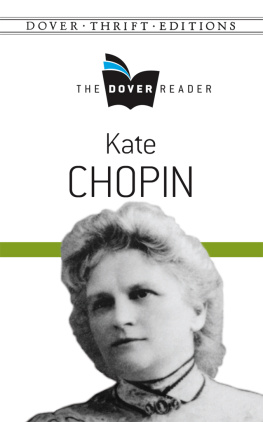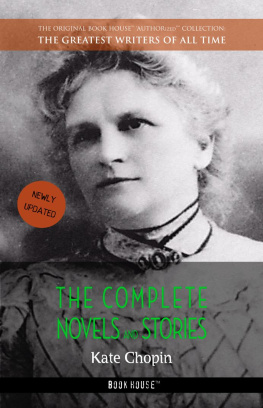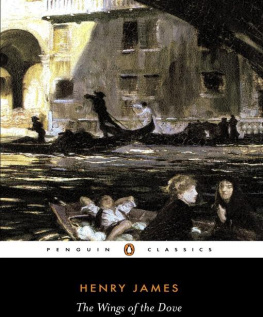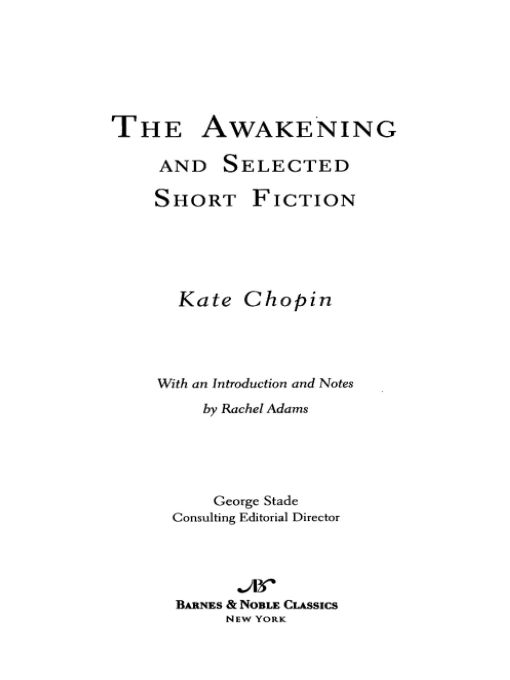
Table of Contents
FROM THE PAGES OF THE AWAKENING
But the beginning of things, of a world especially, is necessarily vague, tangled, chaotic, and exceedingly disturbing. How few of us ever emerge from such beginning! How many souls perish in its tumult!
(page 17)
There were days when she was happy without knowing why. She was happy to be alive and breathing, when her whole being seemed to be one with the sunlight, the color, the odors, the luxuriant warmth of some perfect Southern day. She liked then to wander alone into strange and unfamiliar places. She discovered many a sunny, sleepy corner, fashioned to dream in. And she found it good to dream and to be alone and unmolested.
There were days when she was unhappy, she did not know whywhen it did not seem worth while to be glad or sorry, to be alive or dead; when life appeared to her like a grotesque pandemonium and humanity like worms struggling blindly toward inevitable annihilation. She could not work on such a day, nor weave fancies to stir her pulses and warm her blood.
(pages 67-68)
She felt as if a mist had been lifted from her eyes, enabling her to look upon and comprehend the significance of life, that monster made up of beauty and brutality. But among the conflicting sensations which assailed her, there was neither shame nor remorse. There was a dull pang of regret because it was not the kiss of love which had inflamed her, because it was not love which had held this cup of life to her lips.
(page 97)
She went on and on. She remembered the night she swam far out, and recalled the terror that seized her at the fear of being unable to regain the shore. She did not look back now, but went on and on, thinking of the blue-grass meadow that she had traversed when a little child, believ ing that it had no beginning and no end.
(page 133)
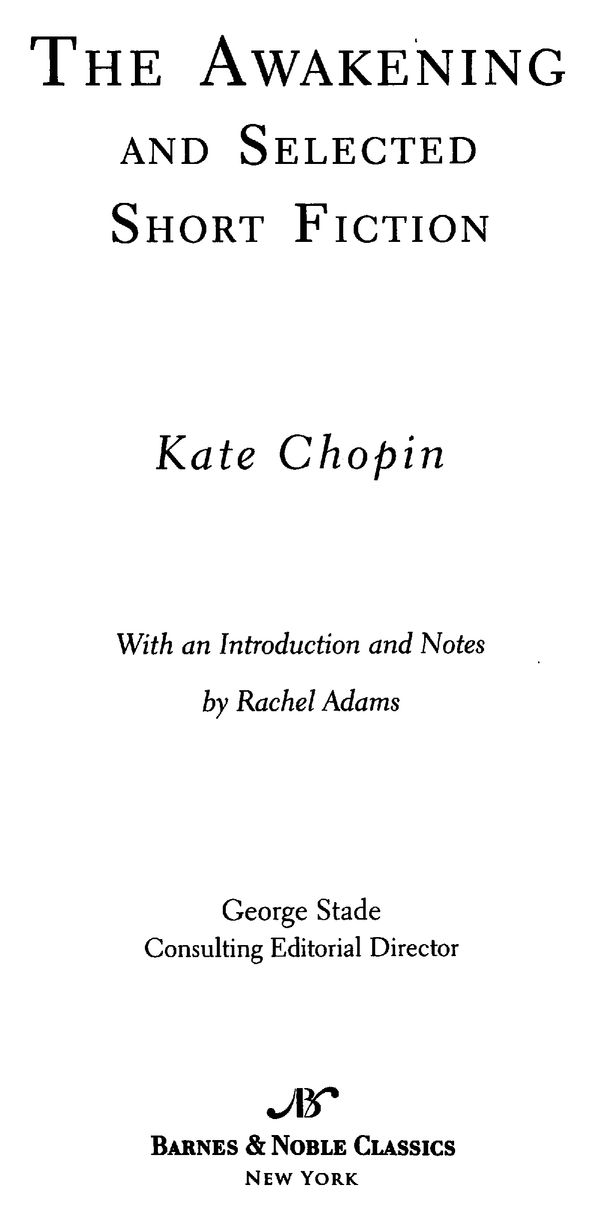
KATE CHOPIN
KATE CHOPIN was born Catherine OFlaherty on February 8, 1850, in St. Louis, Missouri, to Thomas OFlaherty, an Irish immigrant, and Eliza Faris OFlaherty, a Creole (that is, a descendant of the original French settlers of Louisiana). Chopins sense of womanhood derived largely from the influences of her Creole great-grandmother and her own mother, who was left widowed in charge of a considerable estate at age twenty-seven. Chopin lived for many years in Louisiana following her marriage in 1870 to Oscar Chopin, with whom she had six children.
As a student at the St. Louis Academy of the Sacred Heart, Chopin kept a commonplace book, a diary of her daily life, and wrote poetry. After the death of her husband in 1882, she became more serious about her writing; since she wrote about the people and culture of New Orleans, Chopin was first known as a Creole writer. She composed more than 100 short stories, which were compiled in ayou Folk (1894) and A Night in Acadie (1897).
Chopin developed a reputation for flamboyance. A woman of independent thought, she belonged to a group of liberal intellectuals who wore eccentric clothing. She disliked social functions but attended them to fulfill her commercial instinct. Although she never considered herself a womens suffragist or a feminist, she associated with womens rights activists who were part of the St. Louis literary circle. During this period, Chopins stories focused on taboo subjects, such as interracial relationships, womens infidelity, and sexuality. The most notable of these stories, ((Dsires Baby, was published in Vogue magazine in 1893.
Chopin transcended her local status with the publication of The Awakening (1899). Influenced by the urbane stories of Guy de Maupassant, Chopin boldly questioned and defied the constraints on a womans freedom and individuality, but not without paying a price. Conservative literary critics relentlessly condemned the novel as immoral, and Chopin found it increasingly difficult to find a publisher. The Awakening was never banned, but the scandal surrounding it placed Chopin on the literary blacklist for years. It would take almost a century for The Awakening to receive due credit as an important work of art; it was revived as a feminist classic in the 1970s.
Kate Chopin died of a cerebral hemorrhage at her St. Louis home on August 22, 1904. In 1992 Chopins missing manuscripts were discovered in an old warehouse in Worcester, Massachusetts. Known as the Rankin-Marhefka Fragments, these papers are now at the Missouri Historical Society in St. Louis.
THE WORLD OF KATE CHOPIN AND THE AWAKENING
| 1820- | Fanny Wright publicly advocates womens suffrage, the abolition |
| 1830 | of slavery, birth control, and liberal divorce laws in her book Course of Popular Lectures and in the Free Enquirer, a radical journal on civil rights. |
| 1848 | The Seneca Falls Convention for Womens Rights takes place in Seneca Falls, New York. |
| 1850 | Catherine (Kate) OFlaherty is born on February 8 in St. Louis. |
| 1855 | In September Kate enrolls at the St. Louis Academy of the Sacred Heart, a boarding school. She becomes a friend of Kitty Garesch, a classmate who shares her love for reading and writing. On November 1, Kates father, Thomas, dies in a railroad accident. She leaves school for the next two years. |
| 1859 | Charles Darwin publishes On the Origin of Species by Means of Natural Selection. |
| 1861 | On April 12 the American Civil War begins at Fort Sumter, South Carolina. The Garesch family is marginalized for their Confederate sympathies. |
| 1863 | In January Kates great-grandmother and teacher, Victoire Verdon Charleville, dies. In February, George OFlaherty, Kates half-brother and a Confederate soldier, dies from typhoid fever. |
| 1865 | The Civil War ends. The Thirteenth Amendment to the U.S. Constitution outlaws slavery. |
| 1866 | Susan B. Anthony and Elizabeth Cady Stanton found the American Equal Rights Association to promote womens suffrage. |
| 1867 | Kates teachers at the Academy of the Sacred Heart assign her to keep a commonplace book, which becomes a diary of her intellectual and social life. |
| 1868 | In June Kate graduates from the Academy. The Fourteenth Amendment grants African Americans equal protection of the law. |
| 1869 | Kate writes Emancipation: A Life Fable. Anthony and Stanton form the National Woman Suffrage Association to advocate easier divorce and to end gender inequity in employment and pay. The American Woman Suffrage Association (AWSA) is formed in Boston. |
| 1870 | Kate marries Oscar Chopin in St. Louis; the couple spends the summer in Europe, then settles in New Orleans. Kate writes her last diary entry during her three-month honeymoon. The AWSA founds the Womens Journal, edited by Lucy Stone. Womens journals emerge across the nation, including The Woman Voter (New York City) and Western Woman Voter. The Fifteenth Amendment grants African-American males the right to vote. |
| 1871 | On May 22, Kate Chopins first son, Jean Baptiste, is born in New Orleans. She spends the summer months at Grand Isle, a resort for wealthy Creole women, which she will later use as the setting of The Awakening. |


